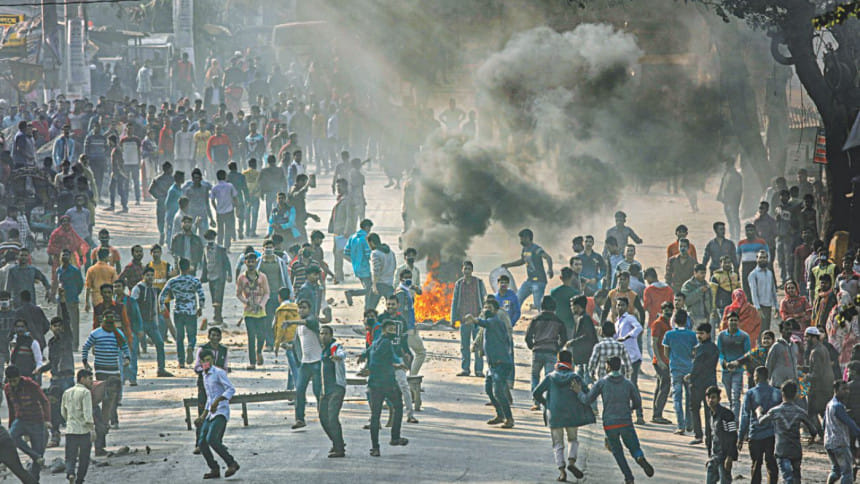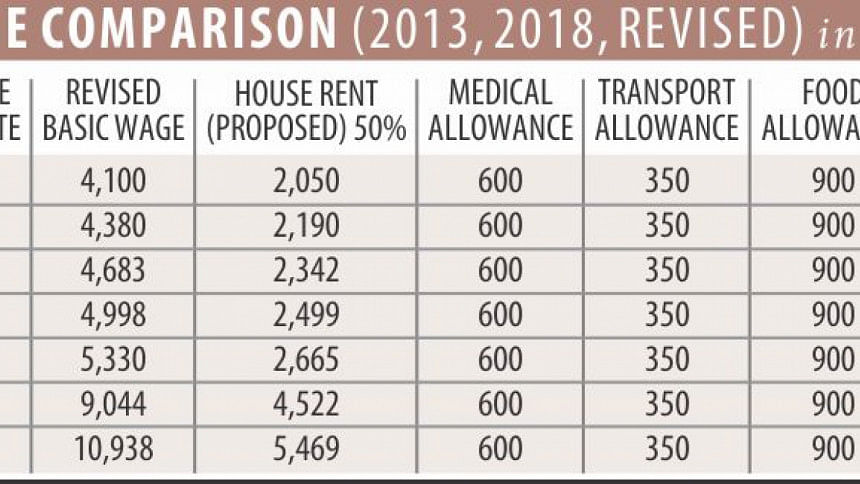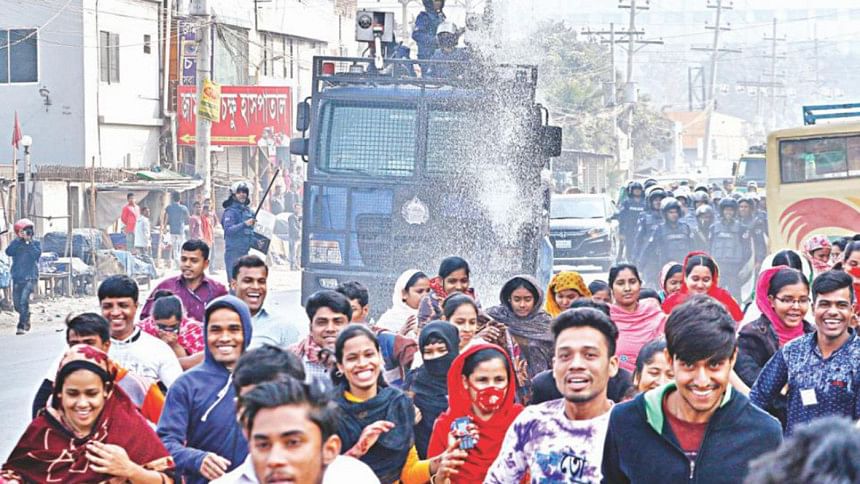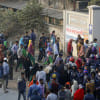Workers' wages rise in 6 grades

After eight days of labour unrest, the government yesterday announced a revised pay structure for the garment sector, with a slight increase in both basic and gross wages in six of the seven grades.
The gross hike ranges from a token Tk 15 to a modest Tk 747, effective from December last year and to be adjusted from February.
In the new pay scale, which comes after years, the annual increment has been fixed at 5 percent.
Workers, protesting since January 6, had been demanding pay raise in three grades in particular -- grade 3, 4 and 5.
Yesterday's decision came following directives from the prime minister after an eventful day.

Even as a tripartite committee held almost a daylong meeting to reach a consensus on the hike, RMG workers continued their protest. On the other hand, factory owners threatened to shut down their units if the protestors did not go back to work.
The meeting of the 20-member committee, which has representation of workers, owners as well as the government, approved wage increase in grade 1-6.
The gross pay in grade 7 remains unchanged at Tk 8,000, which was Tk 5,300 in the previous pay structure announced in 2013.
The government will publish a new gazette on the revised wage in the next three to four days, said Labour and Employment Secretary Afroza Khan, who heads the tripartite committee.
She added that no revision was needed for grade 7 workers.
The committee, formed on January 9, had been considering pay hikes in the three “most problematic” grades -- 3, 4 and 5.
But at a meeting at the Gono Bhaban on Saturday night, Sheikh Hasina instructed officials to revise the latest pay structure, originally announced in September last year, for all grades, sources said.
The workers will receive the arrear with their pay for February, Commerce Minister Tipu Munshi told reporters after the meeting.
“We were mainly concerned about the pay in grade 3, 4 and 5. But we eventually revised the wages in six grades so workers get a little more,” he said, announcing the decision at a press conference at the ministry.
Amirul Haque Amin, president of the National Garment Workers Federation, said, “We welcome the revision and the new wage structure.”
He was speaking on behalf of the trade union leaders who are on the tripartite committee.
Reactions among the workers were mixed.

Alamgir Kabir, who works at a Ha-Meem Group factory, said he was happy and that he would join work today.
But one worker of another factory said he was not satisfied. But he would still go back to work, if his coworkers did so.
Incidents of labour unrest over the pay structure made headlines in early December, a month after the government published a gazette on the pay package for 4.4 million RMG workers.
That protest died down ahead of the general election.
However, when workers drew their wages for January, they spotted a huge disparity -- in some cases, their gross wages came down instead of going up, triggering the latest spell of protest.
After yesterday's announcement, trade union leaders are hoping that the workers will join work.
“We, the trade union orgainsations, do not approve of the anarchy that we have seen over the last few days,” said Amirul of the National Garment Workers Federation.
He also said they would have no objection if the government took action against any wrongs committed during the protest.
“We are requesting the workers to go back to work from tomorrow [today]. We are also calling them to cooperate with the factory managements so they can make up for the loss incurred in the last few days,” he said.
Meanwhile, BGMEA President Siddiqur Rahman yesterday threatened to shut down all factories if the workers did not join work.
"No work, no pay," he told an emergency press conference at the BGMEA office.
Owners may have to face severe consequences such as cancellation of work orders and high air shipment cost, he added.
UNREST CONTINUES
At least 10 garment workers were injured in clashes with police during protest in different areas of Ashulia on Dhaka-Tangail highway yesterday.
The protesters vandalised at least five vehicles, burned tyres and wooden objects on the road, halting traffic for around one and a half hours.
The protest for pay hike continued for the 8th day yesterday, even as a tripartite committee representing workers, owners and the government sat in a meeting to consider their demand.
Protesters at Jamgara and Narsinghpur said they would not leave the streets until the government announced the revised wage structure.
They began their demonstration in the area around 8:00am, blocking a number of roads.
Police quickly rushed to the spots and charged batons to clear the roads. Police also used water cannons and teargas shells on them.
Vehicular movement was halted until 9:30am, creating a huge tailback.
“We dispersed the workers by firing teargas shells and using water cannons as they blocked at least 10 points of the highway and its adjacent roads,” said Sana Shaminur Rahman, superintendent of Dhaka Industrial Police-1.
At least 50 factories in Ashulia area were closed as workers of these factories continued their protests.
In Gazipur, most factories were closed because of the unrest.
As a result, the sector is incurring a huge loss, said owners and officials of several factories.
[Our Savar and Gazipur correspondents contributed to the report.]


 For all latest news, follow The Daily Star's Google News channel.
For all latest news, follow The Daily Star's Google News channel. 








Comments